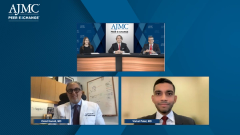
Monitoring Immunotherapy Toxicities in CSCC and BCC
Key opinion leaders emphasize the role of coordinated care between dermatologists and oncologists in monitoring and managing adverse events related to immunotherapy in CSCC and BCC.
Episodes in this series

This is a video synopsis/summary of a Peer Exchange involving Jason Luke, MD, FACP; Christopher Barker, MD; Omid Hamid, MD; Vishal Patel, MD; and Catherine Pisano, MD.
Barker stated that while radiation toxicities can mimic immunotherapy adverse effects, a large analysis did not find radiotherapy increased immune-related adverse event rates when given within 90 days of immunotherapy initiation. Thus, adverse effects likely represent an additive effect of the 2 modalities rather than synergy. He emphasized the importance of continual cross-disciplinary communication to best attribute causality. Patel advised community providers using immunotherapy to have referral networks in place to manage unfamiliar toxicities. Hamid discussed engaging multidisciplinary care early for recurrent or aggressive skin cancers needing complex resection. Pisano described high-risk features that should trigger medical oncology referral, including rapidly enlarging/painful lesions, multiple in-transit metastases, invasion beyond subcutaneous fat, and perineural invasion on microscopy. She explained that subtle signs like skin fixation can sometimes indicate deep invasion on exam when pathology is pending.
Video synopsis is AI-generated and reviewed by AJMC® editorial staff.
Newsletter
Stay ahead of policy, cost, and value—subscribe to AJMC for expert insights at the intersection of clinical care and health economics.









